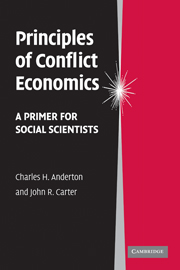Book contents
- Frontmatter
- Contents
- List of Figures
- List of Tables
- Preface
- 1 Introduction: Definition and Scope of Conflict Economics
- 2 Production Possibilities and the Guns versus Butter Trade-Off
- 3 Rational Choice and Equilibrium
- 4 Fundamentals of Game Theory
- 5 A Bargaining Model of Conflict
- 6 Conflict between States
- 7 Civil War and Genocide
- 8 Terrorism
- 9 Geography and Technology of Conflict
- 10 Arms Rivalry, Proliferation, and Arms Control
- 11 Military Alliances
- 12 Conflict Success Functions and the Theory of Appropriation Possibilities
- Appendix A Statistical Methods
- Appendix B A More Formal Bargaining Model of Conflict
- References
- Author Index
- Subject Index
12 - Conflict Success Functions and the Theory of Appropriation Possibilities
Published online by Cambridge University Press: 05 June 2012
- Frontmatter
- Contents
- List of Figures
- List of Tables
- Preface
- 1 Introduction: Definition and Scope of Conflict Economics
- 2 Production Possibilities and the Guns versus Butter Trade-Off
- 3 Rational Choice and Equilibrium
- 4 Fundamentals of Game Theory
- 5 A Bargaining Model of Conflict
- 6 Conflict between States
- 7 Civil War and Genocide
- 8 Terrorism
- 9 Geography and Technology of Conflict
- 10 Arms Rivalry, Proliferation, and Arms Control
- 11 Military Alliances
- 12 Conflict Success Functions and the Theory of Appropriation Possibilities
- Appendix A Statistical Methods
- Appendix B A More Formal Bargaining Model of Conflict
- References
- Author Index
- Subject Index
Summary
Standard economics treats individuals and groups (including nations) as enriching themselves through specialized production and trade. These are presented as peaceful activities because the resources used and the goods produced and traded are implicitly assumed to be secure from appropriation. We have seen in this book, however, that conflict over resources and goods abound. While previous chapters modeled conflict as a choice and considered the interdependence of economic and conflict variables, this chapter adds a new premise, namely, that appropriation stands coequal with production and trade as a fundamental category of economic activity. The chapter begins with an overview of the conflict success function, which is a key element of the theory of appropriation possibilities. We then present a model of conflict over a resource, which reveals, among other things, a paradox of power and incentives for peaceful settlement. The resource conflict model is then integrated with an Edgeworth box model of production and trade, showing how various economic variables are affected by appropriation possibilities.
Conflict Success Functions
A central building block for introducing appropriation possibilities into mainstream economic models is the conflict success function (CSF) (Hirshleifer 1995, Garfinkel and Skaperdas 2007). A CSF specifies how the weapons or fighting efforts of players combine to determine the distribution of a contested resource or good. Suppose, for example, that players A and B employ MA and MB units of military goods to determine the holdings of a resource such as land, oil, or water.
- Type
- Chapter
- Information
- Principles of Conflict EconomicsA Primer for Social Scientists, pp. 246 - 268Publisher: Cambridge University PressPrint publication year: 2009



